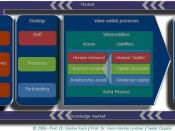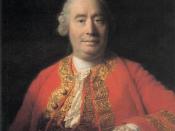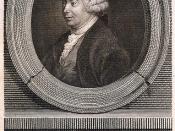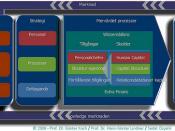Kant and Hume were concerned with the nature of human thought: what was formed within the mind and what knowledge came from our external reality. David Hume believed that all knowledge is derived exclusively from the senses. He was a strict empiricist whose logical arguments went so far as to challenge the basis of empiricism. Kant reasoned that there must be a balance between sensory data (objective) and intuition (subjective) in order to render our reality intelligible.
According to Hume, if all our knowledge is perceived through the senses, there is no sensory impression made by the substance that gives off the sensory data. Therefore, we have no knowledge of it even though logic tells us it does exist. Where do we get this knowledge if not from our senses? Substance itself must be something we imagine since there is no knowledge of substance. If so, not all knowledge arises from the senses.
In addition, Hume questioned the existence of causation. There is no object that gives us knowledge of causation. Therefore, according to Hume, we do not know the concept of what causes sensory data or causation altogether. You can look at an object one way and notice it changes as you turn it. From an exclusively empiricist standpoint you cannot generalize, predict what will happen to it in the future or even understand the concept of an object based on the sensory data we perceive from its components. Hume reasoned that there is no evidence for causation in our senses. How can we explain concepts based on the sensory data we perceive? Going even deeper into this philosophical debate, Hume questioned whether people deprived of sensory data - such as the 18-year -old he mentioned in his example - have thoughts at all. For example: the concept of time is not supplied by the senses, but we know it must exist. Hume was not stating that the entire world existed only in our minds, but his arguments did however logically prove that our imagination helps shape our perception of reality.
Kant built on Hume's concepts rather than attempt to disprove his clever arguments. He believed that knowledge begins with experience, but not all of it comes from it. A priori concepts are constantly created and reshaped by the sensory data from our reality. A priori data help us comprehend the sensory data that surround us by shaping concepts in our mind, tailored by the information we perceive through our senses. Therefore Kant reasoned that knowledge is composed of a combination of sensory data and intuition. By applying a priori intuitions such as time and space, the impressions we receive become logical and give our reality a sense of continuity. Even though a priori concepts are confirmed by the senses, they are not sensory data, but a screen or filter of the sense data we receive. This combination of objective and subjective or classic and romantic understanding brought the passive observer of reality back to the center of an active thought process.





